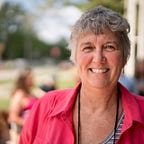“Nomadland”: Freedom or Independence?
I loved the film Nomadland, which I see as a critique of late-stage capitalism and also as a powerful film about aging in America. I did not think it in any way glorified the lifestyle of these nomads, as they moved from one temporary, seasonal job to another and eked out a living in campground campers and vans. The dangers (from weather, breakdowns, and mostly from other people), difficulties, and discomforts of this lifestyle were on full display.
But I think it is wrong to read Fern (played by Frances McDormand) as a person seeking freedom, or this film as being about freedom. For much of the film, it appears that Fern has no relatives, no safety net, no one she can call if she hits a serious bump in the road. She seems to have no choice but to live how she is living. But when she needs money to repair her van, she calls her sister, and does what is required to get the money (a gift or a loan) by taking a bus to visit her sister.
No one, I believe, criticizes Fern for rejecting the option of living in the sister’s guest room. But it is not freedom that Fern would lose. It is independence. She would presumably no longer be able to work, even the circuit of low-paying jobs she has now. She would be dependent on the lifestyle choices of her sister and brother-in-law. It would be, in effect, a form of assisted living.
Fern’s friend Swankie, played by real-life nomad Charlene Swankie, has cancer in the film, a fictional plot point. She would rather take off kayaking in Canada with the time she has left than check into a hospital for treatment. This kind of end-of-life decision, to accept or reject treatment, is common in America, and Swankie chooses independence. In an interview about the film with The Los Angeles Times, Charlene Swankie said: “My character is 99% me. I am fiercely independent and seldom ever ask others to help me, so it was exceedingly difficult to act like I needed Fern’s help. That 1% was acting.” She doesn’t say, “my freedom is important,” rather her independence. Fern doesn’t say she wants to be free. Fern doesn’t say anything, really, about her choices. She just goes about living them.
You need money to have freedom. Money or a stable job or something that allows you to make multiple acceptable choices; that is freedom. Fern’s companions on the road are not young wealthy people opting out of corporate America for a life dedicated to freedom — from which they can also retire at any time and return to a modified but lucrative lifestyle. They are not tweaking their values, learning to live more simply, or on an adventure. In fact, they are not disconnecting from capitalism, but experiencing the absolute bottom of late-stage capitalism. These people have few to no options. The options they have seem binding and compromise their identities. They cannot, therefore, be truly free. They can only be independent — which is no small thing — which is dignity.
This reading of the film also makes me very sad that Fern chooses her nomad lifestyle over staying at the coastal farm where Dave (David Strathairn) lives with his son’s family. Because the choice of independence here means rejecting connection. Holding on to that independence makes it more and more difficult to be connected meaningfully to another, to risk any kind of dependence, even interdependence. Yes, she seems to have deep friendships on the road. But they come and go, weave in and out, scattering and reassembling. As Charlene Swankie says, no one asks for or accepts help. Independence is the chief value.
Fern’s heart doesn’t open to Dave or that beautiful idyll of the family collective. She looks at the home and the things in the home as if in a museum, before leaving in her van without a goodbye. That homestead, and that relationship, seem to offer her space and accept her personality, putting few or no demands on her. Her easy companionship with Dave is her contribution to the home and family. Maybe it is “too nice,” or too bourgeois a choice. But maybe it is too late for the fiercely independent, and ultimately stranded solo Fern to make any other choice but the desert.
